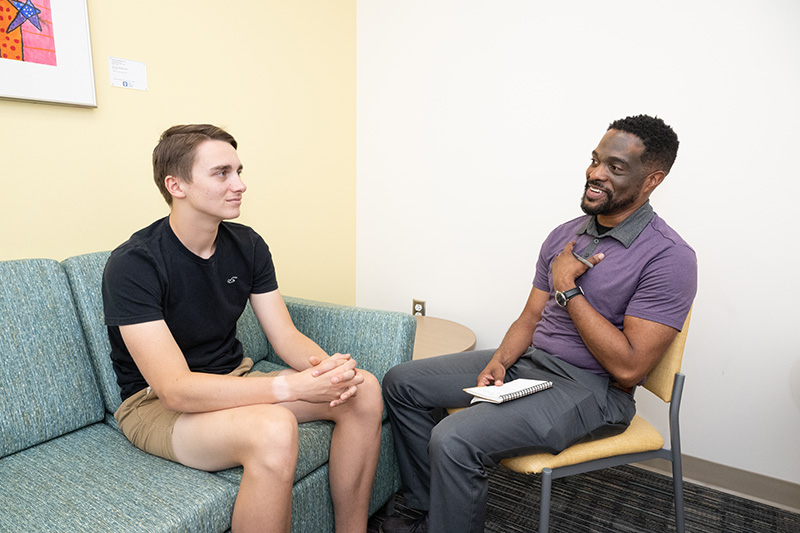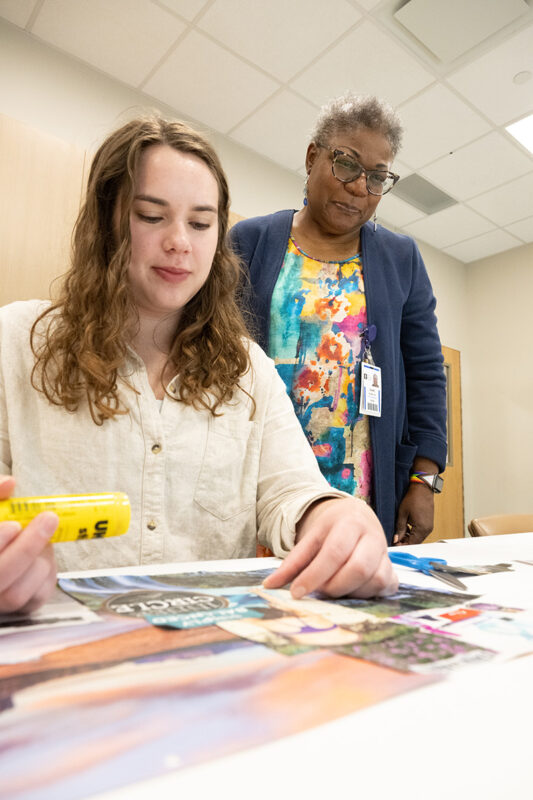
As a behavioral health counselor, Mark Edwards, LPCC, (right) provides outpatient therapy in the Lois and John Orr Family Behavioral Health Center.
As Akron Children’s new director of Pediatric Psychiatry and the newly formed department of Behavioral Health, Eva Szigethy, MD, PhD, is creating new models for delivering behavioral health services, with an increased focus on prevention, screening, brief practical interventions, care coordination and outcomes tracking.
“Through prevention, screening and early intervention, we can better manage symptoms before they escalate to requiring inpatient care,” said Dr. Szigethy, who also holds the Lois C. Orr Endowed Chair in Pediatric Psychiatry. “We are also building out new acute care options because inpatient care is not one-size-fits-all. Some may need urgent holding for a few hours or short-term observation instead of intensive inpatient care. About 80% of the youth who come to the emergency department in a behavioral health crisis can be better served in other ways. We have to reduce the revolving door.”
In 2021, the American Academy of Pediatrics, the American Academy of Child and Adolescent Psychiatry and the Children’s Hospital Association declared a National State of Emergency in Children’s Mental Health in response to rising rates of childhood mental health concerns, including suicide, a leading cause of death for youth ages 10 to 24.
In surveying parents and other community members throughout the region as part of its 5th Community Health Needs Assessment, published in December, Akron Children’s identified behavioral health as a top concern. Expanding access to this care, including strengthening education, training and workforce development, is now a strategic priority for the hospital.
One of the ways Akron Children’s will meet the behavioral health care needs of children and teens more effectively is through stand-alone behavioral health centers that are strategically located where the needs are great and there are gaps in existing resources. Our first behavioral health center opened in Boardman in 2019. New centers in Canton and Mansfield are now open.
“Along with providing beautiful physical space that is inspiring and uplifting for patients and staff, our behavioral health centers ensure the standardization of care provided by multidisciplinary teams of psychiatrists, psychologists, psychiatric nurse practitioners and mental health counselors,” said Dr. Szigethy.
Many of the staff in our behavioral health centers live in those communities, so they have a pulse on local resources, which will help them fill unmet needs. Along with outpatient therapy, these centers provide intensive mental health services for adolescents who are struggling with severe emotional distress that puts them at risk for self-harm. This includes our Intensive Outpatient Program (IOP) and Partial Hospitalization Program (PHP).
“For 99% of kids who are at-risk for suicide, there are four major drivers that put them at the risk: substance use, family conflict, peer conflict and social determinants of health. We are framing our programming by addressing these drivers,” said Dr. Szigethy. “As the behavioral health care needs of youth continue to increase, we know this can’t be solved by hiring more mental health therapists and opening more locations for therapy. We have to get youth to the right level of care and forge relationships with other community resources.”

Art therapist Diane Troyer leads behavioral health patients in expressing their emotions through art.
“In opening our behavioral health centers, we did our due diligence and connected with other agencies in each of these communities,” said Doug Straight, director, behavioral health services. “We continue to have ongoing meetings to discuss trends and how to best work together. It’s about being collaborative and identifying what each organization does really well.”
To serve more children and teens where they live, mental health specialists have been fully integrated into our 40 primary care locations, with the goal of providing services five days a week. These mental health specialists are receiving training at Seattle Children’s Hospital on providing brief, evidence-based behavioral therapy for common mental health concerns. If more help is needed, patients can be linked to other levels of care.
“As we step up our care with more targeted programming and community collaboration, those drivers that put kids at risk will continue to be top-of-mind. This approach also avoids unhelpful stigma labeling. Our patients’ behavioral health issues are not who they are, but a response to one or more of those drivers,” Dr. Szigethy said.
Another strategy Dr. Szigethy plans to implement is the building out of digital behavioral tools to provide coping techniques that patients can use in real-time to manage stress, anxiety and depression. While at UPMC Children’s Hospital of Pittsburgh, she led a multi-center research project regarding a phone app called RxWell, which shows great promise in reducing depression and anxiety in young people.
She also noted a need for more prescribers in the region who can provide medical management of mental illnesses, as well as the strengthening of Akron Children’s addiction services.
“We have to think about the circles around each child and how can we make an impact, such as through their schools, families and opportunities in the community,” Dr. Szigethy said.
To make a referral to Akron Children’s Pediatric Psychiatry and Behavioral Health services at any location, call 330-543-5015.










